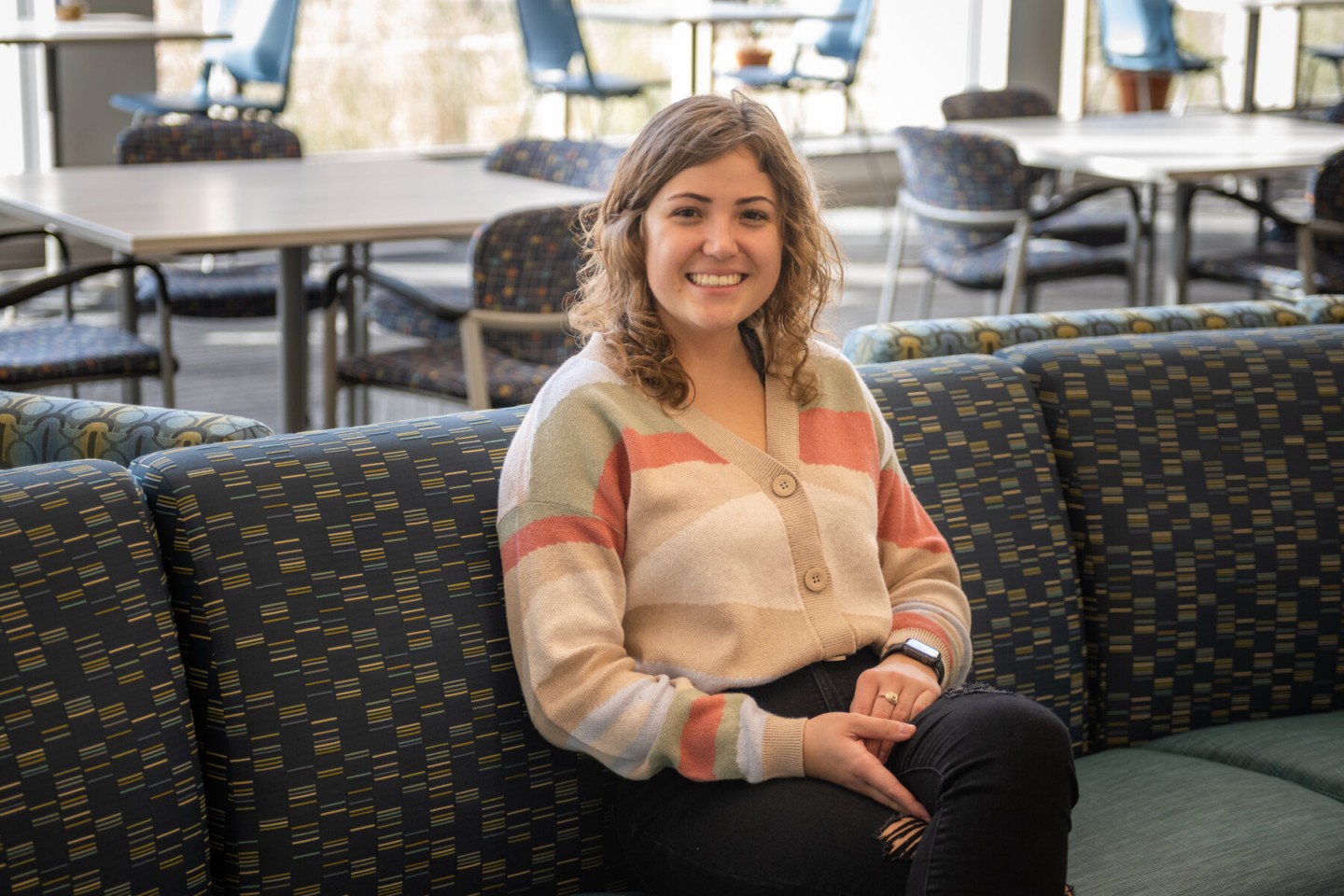Neurochemistry Connections
With an enthusiasm for science, Kate Loidolt ’24 gained experience conducting research with a Concordia grad at Harvard.

Kate Loidolt ’24, Plymouth, Minn.
Majors/Minor: Chemistry, Neuroscience; Psychology
Why did you choose Concordia?
My cousin is an alum. That’s how Concordia got on my radar. But when I did an overnight stay and got to sit in on Dr. Mach’s neurochemistry class, I was drawn to Concordia’s science programs and the new science building.
What do you appreciate most about living in the Fargo-Moorhead area?
I appreciate how the college can feel like its own small community but that there is a city with plenty to do only minutes away.
What activities are you involved in?
I have been researching with Dr. Strand and the neuroscience department. We are currently looking at anxiety and memory of Zebrafish and have some cell culture projects going. I also am the vice president of the Concordia Neuroscience Society (CNS) this year.
How did you decide on your majors?
I’ve always been good at numbers, but I realized I don’t just want to sit staring at a computer screen running numbers all day. Wanting to stay in the sciences, I decided on neuroscience and chemistry majors because I want to research mental illnesses, specifically autism and anxiety. I don’t know yet whether or not that’s from the behavioral/psychological side or the pharmaceutical and chemical pathways involved.

What interests you the most about neuroscience?
What I am most interested in is the psychology surrounding social behavior, as well as how moods (anxiety) and environments can play a role.
Have you had a favorite professor or class and why?
My favorite class so far has been Organic Chemistry with Dr. Rutherford. The workload I admit was intense, but it pushed me to study not just for a grade but for understanding.
What has been the highlight of your time at Concordia so far?
Definitely the people I’ve met!
Have you had a PEAK (Pivotal Experience in Applied Knowledge) opportunity and, if so, what did you learn?
Yes! The summer after my freshman year, I got the opportunity to do URSCA research here at Concordia under Dr. Strand and Harshana De Silva Feelixge. While testing the effect of music enrichment on anxiety and memory in Zebrafish, we also participated in weekly workshops led by professors to help us learn essential skills like resume building, interpersonal relations, transferable skills, and vocation talks.

You received a neuroscience grant to conduct research at Harvard this past summer. What was the application process like and what led you to apply for this opportunity?
We actually got the opportunity to create a relationship with Harvard and work under a Cobber alum, Dr. Daniel Ram, at the Harvard-affiliated hospital BIDMC.
How did Concordia help prepare you for this experience?
I’d say having the mindset to ask questions and being eager to learn all you can stemmed from my Concordia classes.
What was it like to study at such a prestigious place as Harvard?
Incredible! I got to have hands-on experience with techniques such as flow cytometry and immunohistochemistry as well as cell culture training in a BSL-2 lab.
What did you research during your time at Harvard and what did a typical day look like for you?
Dr. Ram wanted us to have an individual project as well as get experience with a bunch of different techniques. His research focuses on how SIV affects natural killer (NK) cells at the level of transcription and alternative splicing. For our individual projects, we each got a gene that was affected during SIV infection. A normal day for us in the lab started with immunohistochemistry staining to look at gene and NK cell expression. We also worked in a BSL-2 lab doing cell culture and transfection experiments, learned analysis techniques like flow cytometry and fluorescence imaging on the microscope, as well as contributing to a morphology project counting microglial cells at two different points of SIV infection.

What challenges did you encounter and how did you overcome them?
I was also taking an online class over the summer, which was hard to manage time in order to get the most out of both experiences.
Who have been your biggest supporters to pursue this opportunity?
My family and friends, definitely, as well as Dr. Strand and Harshana!
Would you encourage this type of experience to other students?
For this specific experience, I would encourage all science students, yes! On the idea of summer internships, I encourage all majors to get real-life work experience during college.
What sets Concordia apart from other undergraduate schools?
I think that the relationships you can build with your professors is what sets Concordia apart from other undergraduate schools.

What advice would you give to a student considering Concordia?
The advice I would give students considering Concordia is to come experience daily life. Attending a class and staying overnight was how I was ultimately drawn to Concordia!
What are your plans for the upcoming year?
Tackling physical chemistry.
Published November 2022